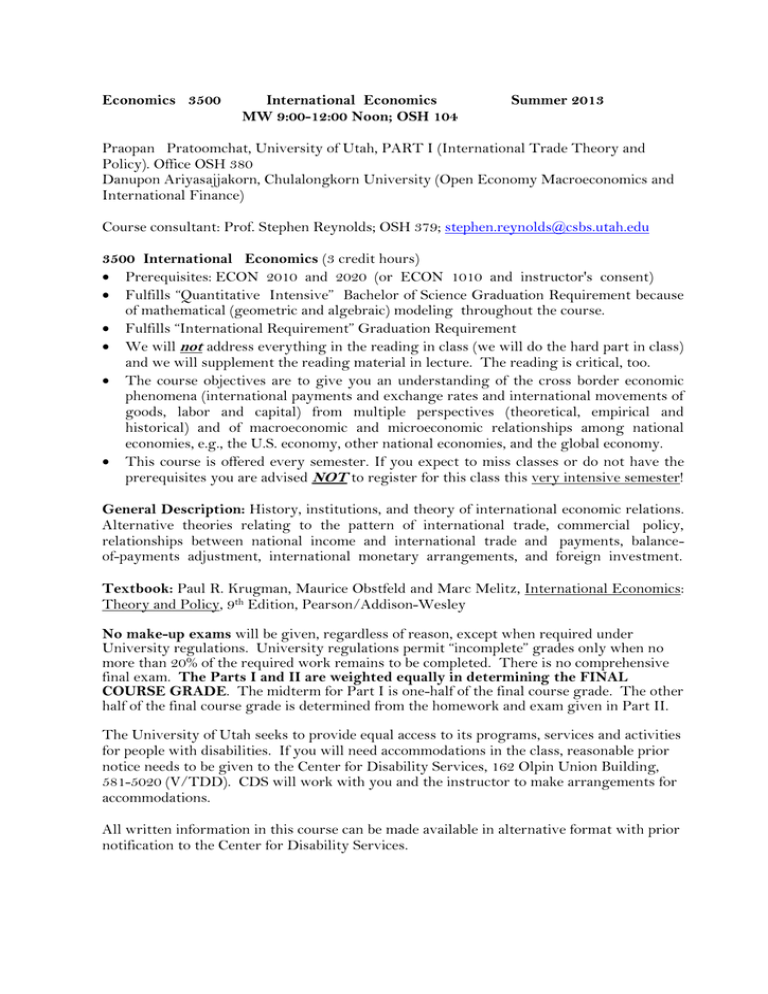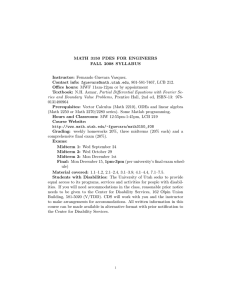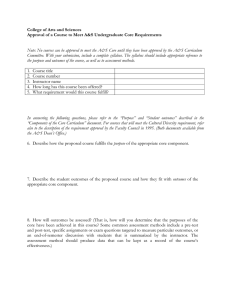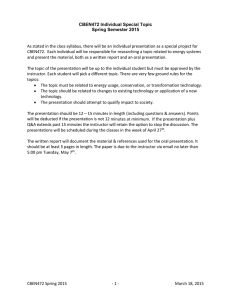
Economics 3500
International Economics
MW 9:00-12:00 Noon; OSH 104
Summer 2013
Praopan Pratoomchat, University of Utah, PART I (International Trade Theory and
Policy). Office OSH 380
Danupon Ariyasajjakorn, Chulalongkorn University (Open Economy Macroeconomics and
International Finance)
Course consultant: Prof. Stephen Reynolds; OSH 379; stephen.reynolds@csbs.utah.edu
3500 International Economics (3 credit hours)
Prerequisites: ECON 2010 and 2020 (or ECON 1010 and instructor's consent)
Fulfills “Quantitative Intensive” Bachelor of Science Graduation Requirement because
of mathematical (geometric and algebraic) modeling throughout the course.
Fulfills “International Requirement” Graduation Requirement
We will not address everything in the reading in class (we will do the hard part in class)
and we will supplement the reading material in lecture. The reading is critical, too.
The course objectives are to give you an understanding of the cross border economic
phenomena (international payments and exchange rates and international movements of
goods, labor and capital) from multiple perspectives (theoretical, empirical and
historical) and of macroeconomic and microeconomic relationships among national
economies, e.g., the U.S. economy, other national economies, and the global economy.
This course is offered every semester. If you expect to miss classes or do not have the
prerequisites you are advised NOT to register for this class this very intensive semester!
General Description: History, institutions, and theory of international economic relations.
Alternative theories relating to the pattern of international trade, commercial policy,
relationships between national income and international trade and payments, balanceof-payments adjustment, international monetary arrangements, and foreign investment.
Textbook: Paul R. Krugman, Maurice Obstfeld and Marc Melitz, International Economics:
Theory and Policy, 9th Edition, Pearson/Addison-Wesley
No make-up exams will be given, regardless of reason, except when required under
University regulations. University regulations permit “incomplete” grades only when no
more than 20% of the required work remains to be completed. There is no comprehensive
final exam. The Parts I and II are weighted equally in determining the FINAL
COURSE GRADE. The midterm for Part I is one-half of the final course grade. The other
half of the final course grade is determined from the homework and exam given in Part II.
The University of Utah seeks to provide equal access to its programs, services and activities
for people with disabilities. If you will need accommodations in the class, reasonable prior
notice needs to be given to the Center for Disability Services, 162 Olpin Union Building,
581-5020 (V/TDD). CDS will work with you and the instructor to make arrangements for
accommodations.
All written information in this course can be made available in alternative format with prior
notification to the Center for Disability Services.
PART I: International Trade Theory and Policy
May 13
Introduction, Overview of the World Trade
Krugman et. al. Ch. 1, 2
May 15
Labor Productivity and Comparative Advantage : The Ricardian Model,
Specific Factors and Income Distribution
Krugman et.al. Ch. 3 and 4
May 20
Resources and Trade: The Heckscher-Ohlin Model, The Standard Trade
Model
Krugman et.al. Ch. 5, and 6
May 22
External Economies of Scale and the International Location of Production
Krugman et.al. Ch. 7 and 8
May 27
No class on Memorial Day
May 30
1st Midterm Exam
June 3
National Income Accounting, Trade Balance and Balance of Payments, Ch.13
June 5
Currency Exchange Rates, the Foreign Exchange Market, Ch.14
Money, Interest Rates, and Exchange Rates, Ch.15
June 10th
Price Levels and the Exchange Rate in the Long Run, Ch.16
Output and the Exchange Rate in the Short Run, Ch.17
June 12th
Fixed Exchange Rates and Foreign Exchange Intervention, Ch.18
International Monetary Systems: an Overview, Ch.19
June 17th
Optimum Currency Areas and European Experience, Ch.20
Financial Globalization: Opportunity and Crisis, Ch.21
June 19th
2nd Midterm Exam
Please note that the course syllabus is subject to change due to time constraint
and/or any other reasons, which in the lecturer’s professional judgment will be of benefit to
students. At the discretion of the instructor, there may be adjustments to the syllabus
and/or course material, lecture and/or exam, including additional assignments, etc.
Policy : No make-up exams will be given, regardless of reason, except when required
under University regulations. I will only give a makeup midterm and final if:
1) You are very ill and have to be under a physician’s care for this condition. Supply of
a note from your physician has to be provided.
2) An immediate family member is very ill or has an emergency situation and you have
a good reason why this prevents you from attending the exam. I will be the judge of
whether your reason is good enough.
Note : The makeup exam will be held by the university testing center. You have to notify
me in advance to arrange the appointment with the testing center.
SOME IMPORTANT UNIVERSITY POLICIES:
“The University of Utah seeks to provide equal access to its programs, services and activities for
people with disabilities. If you will need accommodations in the class, reasonable prior notice needs
to be given to the Center for Disability Services, 162 Union Building, 581-5020 (V/TDD). CDS
will work with you and the instructor to make arrangements for accommodations.”
(www.hr.utah.edu/oeo/ada/guide/faculty/)
“All students are expected to maintain professional behavior in the classroom setting, according to
the Student Code, spelled out in the Student Handbook. Students have specific rights in the
classroom as detailed in Article III of the Code. The Code also specifies proscribed conduct (Article
XI) that involves cheating on tests, plagiarism, and/or collusion, as well as fraud, theft, etc.
Students should read the Code carefully and know they are responsible for the content. According
to Faculty Rules and Regulations, it is the faculty responsibility to enforce responsible classroom
behaviors, beginning with verbal warnings and progressing to dismissal from class and a failing
grade. Students have the right to appeal such action to the Student Behavior Committee.”
“Faculty…must strive in the classroom to maintain a climate conducive to thinking and learning.”
PPM 8-12.3, B. “Students have a right to support and assistance from the University in
maintaining a climate conducive to thinking and learning.” PPM 8-10, II. A. The Student Code is
spelled out in the course schedule. Students have specific rights in the classroom as detailed in
Article III of the code. The code also specifies proscribed conduct (Article XI) that involve cheating
on tests, plagiarism, and/or collusion, as well as fraud, theft, etc. Students may receive sanctions for
violating one or more of these proscriptions. The instructor of this class will enforce the code in
this course; cheating and plagiarism will result in appropriate penalties, such as a failing grade on a
specific exam or in the course and/or expulsion from the course. Students have the right to appeal
such action to the Student Behavior Committee.”
“The syllabus is not a binding legal contract. It may be modified by the instructor when the student
is given reasonable notice of the modification.” “Attendance requirements & excused absences: The
University expects regular attendance at all class meetings. An instructor may choose to have an
explicit attendance requirement. Physical attendance may be used as a criterion in determining the
final grade only where it indicates lack of participation in a class where student participation is
generally required or as required by accrediting bodies. Any particular attendance requirements of
a course must be available to students at the time of the first class meeting.” “Students absent from
class to participate in officially sanctioned University activities (e.g., band, debate, student
government, athletics) or religious obligations, or with instructor's approval, shall be permitted to
make up both assignments and examinations. The University expects its departments and
programs that take students away from class meetings to schedule such events in a way that will
minimize hindrance of the student's orderly completion of course requirements. Such units must
provide a written statement to the students describing the activity and stating as precisely as
possible the dates of the required absence. The involved students must deliver this documentation
to their instructors, preferably before the absence but in no event later than one week after the
absence.”“Some of the readings, lectures, films, or presentations in this course may include material
that may conflict with the core beliefs of some students. Please review the syllabus carefully to see
if the course is one that you are committed to taking. If you have a concern, please discuss it with
me at your earliest convenience. For more information, please consult the University of Utah’s
Accommodations Policy, which appears at: www.admin.utah.edu/facdev/accommodations-policy.”



